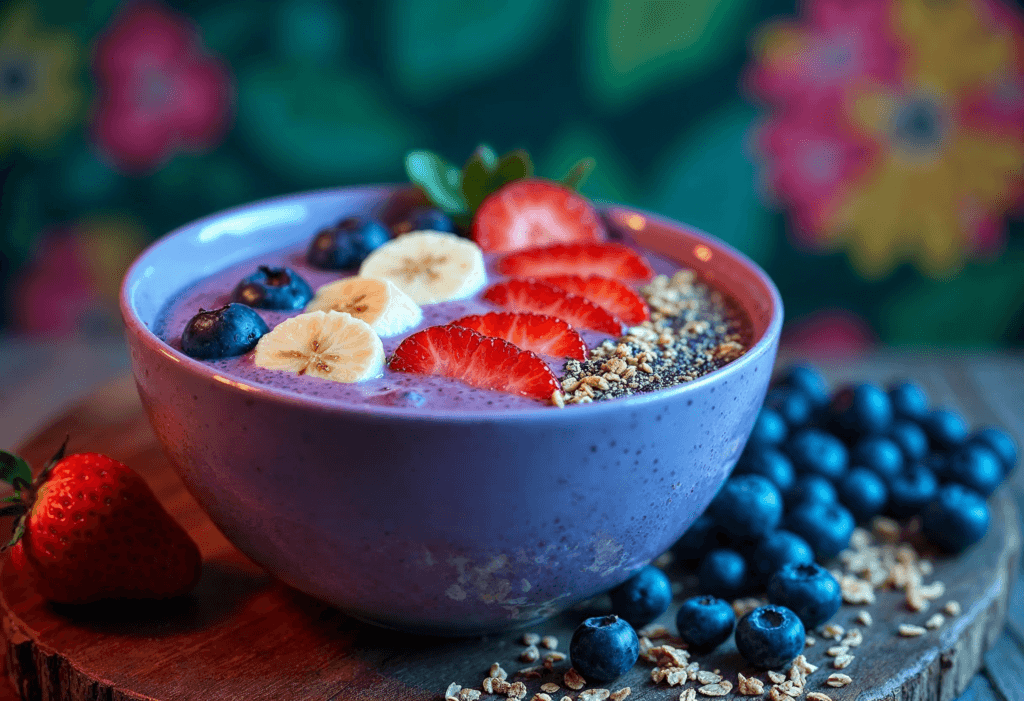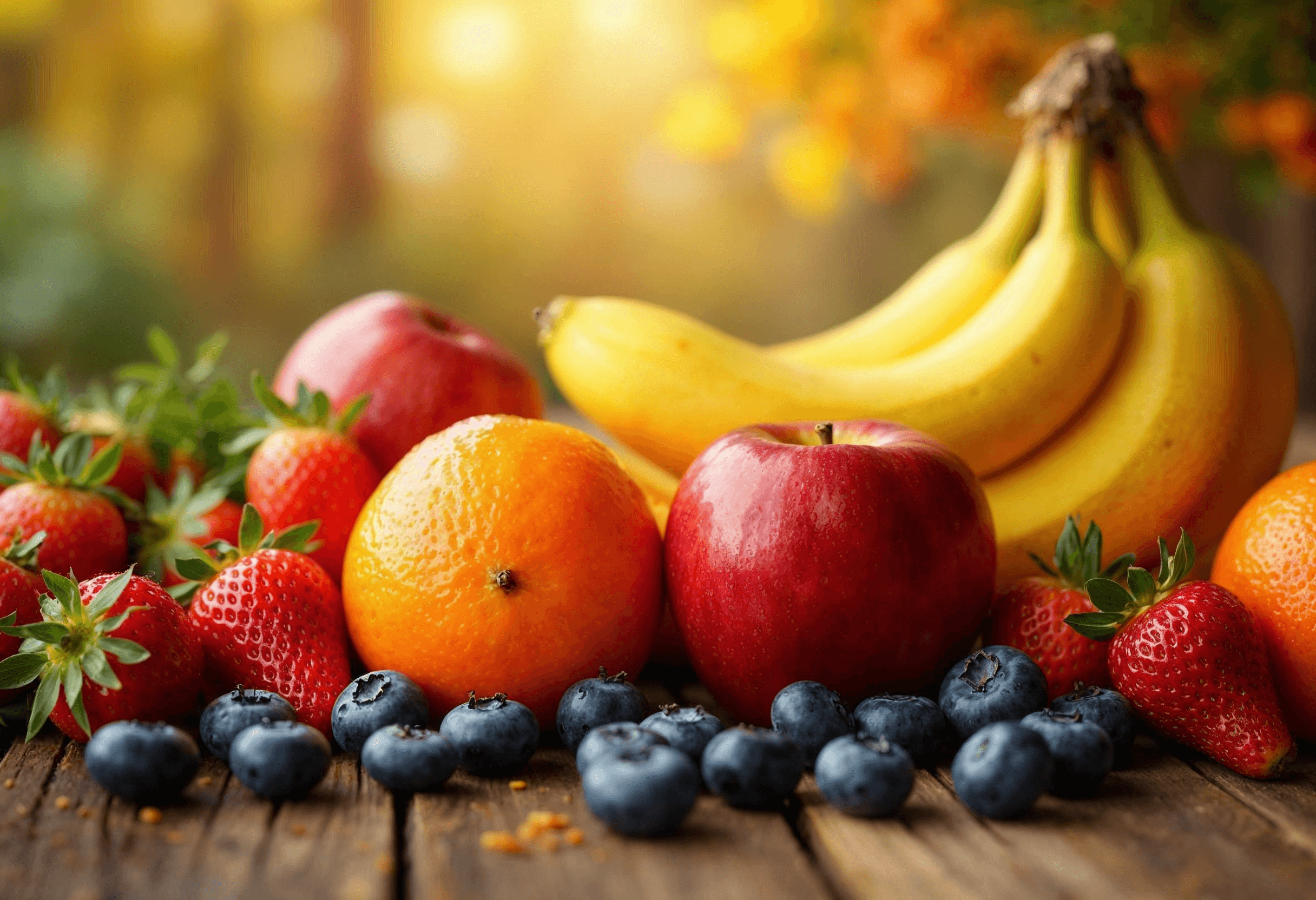When you think of fruits, what comes to mind? Maybe the sweet juiciness of a ripe mango or the tangy bite of an orange? Whatever your favorite fruit is, we’ve all wondered: What is the healthiest fruit out there? 🥝🍓
The truth is, fruits are nutritional powerhouses, each with its unique benefits. But finding the “healthiest” fruit can feel like picking the MVP in an all-star team. In this guide, we’ll dive deep into this fruity debate, explore the contenders, and uncover what makes some fruits stand out as health heroes.
Introduction: The Fascination with Healthy Fruits
Fruits are nature’s candy, but unlike sugary snacks, they come loaded with nutrients that can boost our health in countless ways. They’ve been staples in human diets for centuries, valued not just for their taste but also for their ability to sustain life and promote wellness.
Whether it’s a morning smoothie or a mid-afternoon snack, fruits fit seamlessly into our lives. But the big question remains: Are some fruits better than others? Let’s dig in and find out.
Why Are Fruits Essential for a Healthy Lifestyle?
Fruits are nutritional powerhouses filled with vitamins, minerals, antioxidants, and fiber. They form an essential part of any balanced diet, supporting immunity, digestion, and overall wellness. For example, the health benefits of antioxidants are well-documented in scientific literature (Harvard T.H. Chan School of Public Health).
Explore more on the health benefits of frozen yogurt
Nutritional Value of Fruits
Every fruit is a cocktail of vitamins, minerals, fiber, and antioxidants. These nutrients are like a toolkit for your body, helping it fight off diseases, repair damage, and function at its best. For example:
- Vitamin C in citrus fruits bolsters your immune system.
- Potassium in bananas helps regulate blood pressure.
- Fiber in apples and pears keeps your digestion on track.
But there’s more! Fruits also contain phytonutrients—natural compounds that act as supercharged protectors against inflammation and oxidative stress.
“Fruits are nature’s way of whispering to us: Take care of your body, and I’ll take care of you.”
The Role of Antioxidants in Fruits
You’ve probably heard the word “antioxidants” thrown around a lot. But what does it mean? Antioxidants are compounds that fight free radicals—unstable molecules that can damage your cells and lead to aging and diseases like cancer.
Berries, like blueberries and raspberries, are loaded with antioxidants. In fact, they’re often dubbed “superfruits” for a reason. Every bite fights off those pesky free radicals and keeps your cells humming along happily. 🍇✨
For a delicious twist on fruit-based snacks, consider this yogurt bark recipe that uses berries for a healthy treat.
Discover a healthy yogurt bark recipe here
How Fruits Support Immune Health
Your immune system is like a fortress, and fruits are its strongest allies. Fruits like oranges, kiwi, and guava pack in high doses of Vitamin C, which helps your body produce white blood cells—the frontline soldiers in fighting infections.
Feeling under the weather? Grab a fruit. It’s like handing your body a natural energy boost to fight off those germs.
The Criteria for Determining the Healthiest Fruit
Alright, so how do we crown the healthiest fruit? It’s not as simple as it sounds. There are a few key factors we need to consider.
Nutritional Density
Nutritional density refers to how many vitamins, minerals, and antioxidants are packed into a single serving of fruit. Some fruits, like avocados, are incredibly nutrient-dense, offering high amounts of healthy fats and vitamins for relatively few calories.
Versatility in Diet
Can the fruit fit into multiple meals or snacks? Fruits like bananas and berries score high here because you can toss them into smoothies, cereals, or even savory dishes. The more adaptable a fruit is, the more likely you’ll include it in your diet.
Common Availability and Affordability
Let’s face it—not all fruits are created equal in terms of accessibility. The healthiest fruit should ideally be something you can find easily at your local grocery store without breaking the bank. 🛒
“The healthiest fruit isn’t just the one packed with nutrients but also the one you’ll actually eat every day.”

Top Contenders for the Healthiest Fruit
Now for the fun part—looking at the star players! While every fruit has something special to offer, a few stand out from the crowd.
Berries: Small but Mighty Superfoods
Berries might be tiny, but don’t let their size fool you. They’re some of the most nutrient-dense fruits on the planet.
Blueberries and Their Health Benefits
Blueberries are antioxidant powerhouses. They’ve been linked to improved brain health, better heart health, and even reduced risk of diabetes. Eating a handful of blueberries a day is like giving your body a daily dose of vitality.
Strawberries and Their Nutritional Value
Strawberries are rich in Vitamin C, manganese, and folate. Plus, their sweet taste makes them a favorite for kids and adults alike. Want a dessert that’s both delicious and healthy? A bowl of strawberries drizzled with a little honey is perfection. 🍓
Citrus Fruits: Vitamin C Powerhouses
If you’re looking for an immune boost, citrus fruits are your go-to. Packed with Vitamin C, they’re not just tasty but also protective.
Oranges: A Classic Healthy Fruit
Oranges are timeless. They’re easy to peel, portable, and loaded with nutrients. Plus, they’ve got just the right balance of sweet and tangy to please almost anyone.
Grapefruits: Benefits and Potential Risks
Grapefruits are low in calories and high in nutrients, making them a popular choice for weight-conscious individuals. But beware—they can interact with certain medications, so always check with your doctor if you’re on prescriptions.
Tropical Fruits: Exotic Nutrition Boosters
Sometimes, you just need a taste of the tropics. Tropical fruits like papayas and avocados offer unique benefits that make them worthy of attention.
Avocado: The Healthy Fat Fruit
Avocado is in a league of its own. It’s rich in heart-healthy monounsaturated fats, which can lower bad cholesterol and raise good cholesterol. Add some avocado slices to your toast or salads for a creamy, nutritious boost. 🥑
Papaya: Digestion’s Best Friend
Papayas are loaded with papain, an enzyme that helps break down proteins and aids digestion. If you’ve ever had an upset stomach, papaya might just be your best friend in fruit form. 🍈
Stay tuned for Part 2, where we’ll dive into the common challenges and solutions when incorporating fruits into your diet! 😊
Most Common Problems with Fruits in a Healthy Diet
While fruits are undeniably healthy, they’re not without their challenges. Whether it’s concerns about sugar, allergies, or even pesticides, there are a few hurdles to address before you can fully embrace the fruity life.
High Sugar Content: A Double-Edged Sword
One of the most common concerns people have about fruits is their sugar content. While natural fruit sugars are far better than added sugars found in processed foods, they can still add up. For example, tropical fruits like mangoes and pineapples are higher in sugar compared to berries or citrus fruits.
Does this mean you should avoid fruits? Not at all! It’s all about balance. Fruits are rich in fiber, which helps slow down sugar absorption, making them a much healthier option than candy or soda.
Allergies and Sensitivities to Certain Fruits
Ever felt your mouth itch after biting into a fresh peach? You’re not alone. Fruit allergies and sensitivities can range from mild discomfort to more serious reactions. Common culprits include bananas, kiwis, and melons, which can trigger oral allergy syndrome (OAS) in some individuals.
If this sounds like you, it’s crucial to identify your triggers. Keeping a food diary or consulting with an allergist can help you enjoy fruits safely.
“Even if you’re sensitive to some fruits, there’s a whole world of options out there waiting to be explored.” 🍍
The Debate Over Organic vs. Non-Organic Fruits
To go organic or not—that’s the million-dollar question. Organic fruits are grown without synthetic pesticides, which makes them a great choice for those concerned about chemical exposure. However, they can be pricey and not always available.
Non-organic fruits, on the other hand, are still packed with nutrients. To reduce pesticide residues, you can wash and peel fruits where appropriate. If you’re on a budget, focus on buying organic versions of the “Dirty Dozen” (fruits with the highest pesticide levels) while going conventional for the “Clean Fifteen.”

Solutions to Common Fruit-Related Issues
Now that we’ve identified the challenges, let’s look at some practical solutions to make fruits an easy and enjoyable part of your diet.
Managing Sugar Intake from Fruits
If you’re worried about sugar, opt for fruits with a lower glycemic index (GI). These include berries, cherries, and apples, which cause a slower and more stable rise in blood sugar levels. Pairing fruits with a source of protein or healthy fat, like nuts or yogurt, can also help balance your blood sugar.
For example, instead of snacking on a banana alone, add a tablespoon of peanut butter for a delicious and nutrient-packed combo. 🍌🥜
Identifying and Avoiding Allergic Triggers
Dealing with fruit allergies doesn’t mean you have to miss out. Try these strategies:
- Cook or bake fruits: Heating fruits can break down the proteins that cause allergies, making them safer to eat.
- Experiment with alternatives: If you can’t eat fresh apples, try applesauce or apple juice (if tolerated).
- Expand your options: Fruits like dragon fruit or passion fruit might not trigger the same reactions.
Remember, there’s no shortage of fruits to explore. Who knows? You might even discover a new favorite. 🌟
Choosing the Best Fruits for Your Needs
Tailor your fruit choices to your specific goals. Want to boost your energy levels? Reach for a banana. Looking to hydrate after a workout? Watermelon is your best friend. Each fruit has unique benefits that can suit your lifestyle.
“Think of fruits as tools in your wellness toolkit—each one serves a unique purpose.”
Special Diet Considerations and Fruits
Certain diets have specific requirements, and fruits can play a vital role in meeting those needs. Let’s look at some common scenarios and the best fruits for each.
Fruits for Weight Loss: The Best Choices
If shedding a few pounds is your goal, focus on fruits that are low in calories but high in fiber. Apples, berries, and grapefruits are excellent options. These fruits fill you up without adding too many calories, helping you control your portions.
Pro tip: Swap high-calorie snacks like chips or cookies with a handful of grapes or a sliced cucumber for a healthier alternative.
Fruits for Diabetics: Low-Glycemic Options
For those managing diabetes, fruit can still be part of a healthy diet. Stick to fruits with a lower glycemic index, like berries, pears, and oranges. These fruits have less impact on blood sugar levels and come with added benefits like fiber and vitamins.
Avoid fruit juices or dried fruits, as these are often concentrated sources of sugar. Instead, enjoy whole fruits for their natural sweetness and nutritional benefits.
Fruits for Heart Health: Nutritional Heroes
Want to keep your heart happy? Load up on fruits rich in potassium and antioxidants. Bananas, oranges, and avocados help regulate blood pressure, while berries can improve cholesterol levels. Toss these fruits into your meals to give your heart some extra love. ❤️
The Healthiest Ways to Consume Fruits
How you eat your fruits matters almost as much as which fruits you choose. Let’s explore some of the best practices for enjoying fruits to the fullest.
Fresh vs. Dried Fruits: What’s Better?
Fresh fruits are typically the best choice because they retain their natural water content and are lower in calories. However, dried fruits like raisins or apricots can still be healthy—just keep an eye on portion sizes, as they’re more calorie-dense.
If you’re reaching for dried fruits, opt for ones without added sugars or preservatives. A small handful can be a great on-the-go snack.
H3: Benefits of Juicing vs. Eating Whole Fruits
Juicing has its pros and cons. While fresh fruit juices can be packed with vitamins, they often lack fiber, which is essential for keeping you full and supporting digestion.
Eating whole fruits ensures you get all the fiber and nutrients they have to offer. If you’re a fan of juicing, try blending instead. This way, you’ll keep the pulp and maximize the fruit’s benefits.
Incorporating Fruits in Balanced Meals
Don’t just eat fruits as snacks—make them a part of your meals. Here are some ideas:
- Breakfast: Add sliced bananas or berries to your oatmeal.
- Lunch: Toss orange segments into your salad.
- Dinner: Serve grilled pineapple alongside chicken or fish.
These little tweaks can turn a regular meal into a nutrient-packed powerhouse.
Stay tuned for Part 3, where we’ll explore expert opinions, trends, and the ultimate conclusion to the healthiest fruit debate! 😊
Expert Opinions on the Healthiest Fruits
Let’s face it—when it comes to nutrition, everyone seems to have an opinion. But what do the real experts have to say about the healthiest fruits? Spoiler alert: their insights are as juicy as a perfectly ripe peach. 🍑
Insights from Nutritionists and Dieticians
Most nutritionists agree on one thing: there isn’t a single “healthiest” fruit, but rather a variety of fruits that bring different benefits to the table. Here’s a quick roundup of their advice:
- Dr. Sarah Jenkins, RD: “Fruits like berries are fantastic because they’re low in sugar and high in antioxidants, which makes them great for long-term health.”
- Dr. Michael Brown, MD: “Don’t overlook bananas—they’re nature’s energy bar and an excellent source of potassium, which supports heart health.”
Experts emphasize that the best fruit for you depends on your individual health goals and dietary needs. Trying to lose weight? Go for berries. Looking to boost your energy? Bananas are your best bet. The secret lies in mixing and matching.
Popular Trends in Fruit Consumption
Fruits have become trendy in recent years, thanks to social media and an increasing focus on health. Let’s take a look at some of the most popular fruit trends right now:
- Smoothie Bowls: Vibrant smoothie bowls loaded with fruits like acai, bananas, and berries have taken Instagram by storm. These bowls aren’t just pretty—they’re packed with nutrients.
- Exotic Fruits: Dragon fruit, lychee, and rambutan are stealing the spotlight for their unique flavors and stunning appearances. Plus, they’re nutrient-dense and fun to try.
- Frozen Fruit Snacks: Instead of sugary ice cream, people are reaching for frozen grapes or blended fruit popsicles for a healthier alternative. 🍧
For more creative ideas, check out this fruit dip recipe for an easy and healthy snack option.
Explore a fruit dip recipe here
Conclusion: A Balanced Approach to Choosing the Healthiest Fruit
At the end of the day, the healthiest fruit is the one you enjoy eating regularly. Fruits are all-stars in the health game, and each one brings its own set of benefits. The key is variety and balance.
Final Thoughts on the Healthiest Fruit Debate
So, is there a definitive “healthiest fruit”? Not really, but that’s the beauty of it! You don’t have to choose just one. Each fruit offers unique benefits, and eating a colorful mix ensures you’re covering all your nutritional bases.
Imagine your plate as a rainbow 🌈—adding fruits of different colors not only makes your meals more appealing but also boosts their nutrient profile.
“Think of fruits as puzzle pieces—each one adds something special to complete the picture of your health.”
Encouraging Variety and Moderation in Fruit Consumption
While fruits are incredibly healthy, moderation is still essential. Eating too much of even the healthiest fruit can lead to imbalances, whether it’s excess sugar or too much fiber.
Here are a few tips to keep in mind:
- Stick to serving sizes: A cup of berries or a medium-sized apple is typically a good portion.
- Combine fruits with other foods: Pair fruits with nuts, seeds, or yogurt for a well-rounded snack.
- Mix it up: Rotate your fruit choices weekly to keep things exciting and ensure you’re getting a wide range of nutrients.
A Fun Way to Remember the Healthiest Fruits
To make things easier, think of fruits as your “fab five”:
- Berries: Antioxidant superstars that support brain and heart health. 🍓
- Bananas: Energy-packed and perfect for workouts. 🍌
- Citrus Fruits: Immune-boosting Vitamin C champions. 🍊
- Avocado: The healthy fat fruit that’s good for your heart. 🥑
- Apples: A crunchy, fiber-filled option for gut health. 🍏
“Incorporating fruits into your life isn’t just about health—it’s about enjoying nature’s delicious gift.” 🌍
Final Blockquote
“The best fruit for you is the one you’ll eat consistently. Enjoy the diversity, embrace the flavors, and let nature’s bounty fuel your journey to health.” 🌟
In Summary
In this guide, we’ve explored everything from the nutritional benefits of fruits to the common challenges people face and how to overcome them. The bottom line? Fruits are your best allies in the quest for a healthier, happier life.
Whether you’re blending a smoothie, munching on a fresh apple, or savoring a juicy slice of watermelon, you’re doing your body a favor. So, what are you waiting for? Go grab a fruit and take a bite of health today! 🍎🥭

The Healthiest Fruits
Ingredients
Method
- Add sliced bananas or berries to your oatmeal.
- Toss orange segments into your salads for lunch.
- Serve grilled pineapple as a side dish with chicken or fish.
